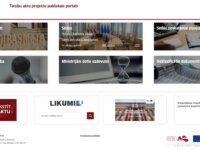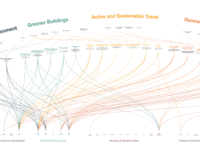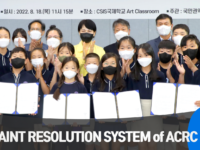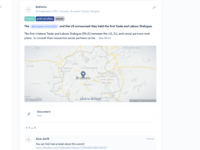The TAP portal is a unique e-government system at the European Union level, which ensures the development of digital government legislation, moving from documents to structured data. The TAP portal ensures the proceedings of the meetings of the Cabinet of Ministers and allows every citizen of Latvia to follow the progress of the Government's decision-making and express an opinion on the regulatory acts being developed by the Government.
Innovation Tag: Public Policy
Achieving carbon neutrality requires collective action involving businesses and residents and encouraging them to participate in local governance processes. The most immediate challenge to enable collaboration is to effectively communicate the multiple lines of actions and operational objectives. The Visual Action Plan gives a holistic overview helping public officers to collaborate internally and externally.
South Korea’s National Ombudsman Institution, Anti-Corruption and Civil Rights Commission (ACRC) is the only public agency in the country that handles all civil collective complaints against governments. ACRC’s collective complaint resolution effectively coordinates and mediates complicate large-scale complaints and suggests alternatives agreed by all parties. The system protects citizens from the infringement of rights and interests and prevents the occurrence of social conflicts.
The AJSC has developed a new model to measure the determinants of the ‘quality of life’ in Ajman, covering six key areas of public service. The Model comprises a comprehensive factor measurement framework embedded on a sophisticated web-based application, with inbuilt protocols for scientific data collection, project management, data visualization and reporting. It systematically measures gaps and impact of interventions, via targeted performance assessment of framework factors.
Case Study
Procurement Planning Platform (PPP) for driving Sustainability, Circularity and Innovation in Lisbon…
Lisbon Municipality aims for more innovation and sustainability in Public Procurement. Urgency and specifications' complexity are excuses for not considering sustainability in tenders and barriers to attracting innovative SMEs and startups. The innovative approach involved users designing and developing the Procurement Planning Platform, using a rapid development tool, cloud-based, and agile methods, which selects and supports a project-led approach for deploying new procurement strategies.
TCS is part of the Government Data Architecture initiative to enable secure data sharing and usage across public service, built upon an integrated data management framework that manages the data lifecycle effectively from acquisition to destruction. It is a one-stop central sensor data platform that provides end-to-end data sharing services with exploitation environment.
The Carbon-Free Island JEJU by 2030 (CFI 2030) policy aims to transform Jeju into a carbon-free island by 2030. It is the first project in the world to target an area with a population of over 500,000 and has been ongoing since 2012. Home to the UNESCO-designated Biosphere Reserve (2002), World Natural Heritage Site (2007), and Global Geopark (2010), Jeju strives towards a carbon-neutral future utilizing state-of-art technology including renewable energy, EV, smart grids, and microgrids.
A proof of concept has been created to incorporate design techniques in many elements of a PoD's life cycle, planning for future demands and overcoming existing hurdles. The proposed strategy prioritizes the needs of persons with disabilities and helps them acquire the resources and services they need. It also helps families gain confidence in caring for a disabled kid. This helps POD engage, lead, create, and sustain life.
Anticipate is a tech-enhanced tool for context monitoring and early warning of conflict. Anticipate fights bias in analysis by encouraging analysts to be forward-looking and removing echo-chambers. It hosts data collection, political-economic analysis, and anticipation in one place. As such, it is a one-stop shop for the public sector to develop policy.
The innovation is a new and comprehensive awareness program to apprise the public of the existing policy and legal framework in which they operate in Lebanon, through the mapping of existing laws and decrees, by topics and sectors. The aim is to understand the existing framework as a first step in working toward a just one. This empowers public officials and citizens with the right information to establish rule of law and accountability and to flag out gaps, inconsistencies and required reforms.






